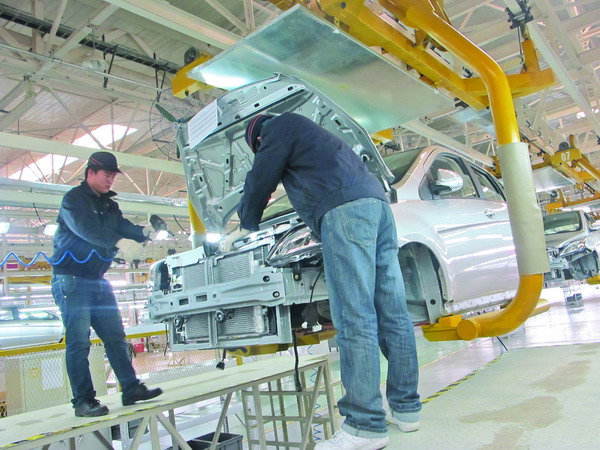Patents crucial in charge toward new-energy cars
Updated: 2013-01-23 14:14
By Hao Nan (China Daily)
|
|||||||||||
With a worldwide push for sustainable, clean transportation, patents are vital to survival in the global new-energy vehicle industry, China Intellectual Property News reported.
China had filed more than 2,000 patent applications - 8 percent of the world total - for new-energy cars by the end of last year to share the third place with Germany and South Korea, according to the statistics from Thomson Reuters.
|
 Workers on the assembly line at BAIC Motor Electric Vehicle Co in Beijing. China had filed more than 2,000 patent applications related to new-energy cars by the end of last year. [Photo / China Daily] |
Japan ranks the first with nearly 9,000 patents, followed by the United States with 4,000, accounting for a respective 60 percent and 22 percent of the world total.
Since China lags behind in patents, it is trying to narrow the gap in other aspects of the industry, said Zhao Yuhai, a senior official from the Ministry of Science and Technology.
"With internationally advanced expertise and research technologies for new-energy vehicles, China has formulated 62 national and industry standards and established testing systems and a complete commercial operation model," Zhao noted.
He said the ministry has supported a number of large development projects beginning with the 10th Five-Year Plan (2001-05) period. With investment totaling 2 billion yuan ($321 million) to date, the initiatives have engaged more than 14,600 professionals in technical research.
"The national strategy to develop new-energy cars has gained ground on many fronts such as in policies and technologies," said Wang Tianwei, an official at Jiading Auto City in Shanghai.
The State Council placed new-energy vehicles as one of the seven national strategic emerging industries for the past six years, especially in development of pure electric and hybrid cars.
The country now has 55 research centers and 87 commercialization bases in the emerging industry.
Among the breakthroughs is a home-developed hybrid bus that cuts fuel consumption by half to less than 24 liters per 100 kilometers, using a battery that can run for more than 3,000 consecutive hours, according to the ministry.
About 27,400 new-energy cars were on the road in 25 pilot cities last year, with the number projected to reach nearly 40,000 by the end of March.
Buyers enjoy steep discounts as various levels of government provide automakers and buyers with subsidies and other preferential policies.
But "battery performance remains the greatest threat to the credibility of electric vehicles in motorists' eyes", said Wang. "Chinese companies need to make more effort in improving battery technology."
Another widespread concern is the lack of recharging stations, he said.
"It may be the main reason consumers hesitate to buy an electric car," he added.
haonan@chinadaily.com.cn
Latest on new-energy cars
30K new-energy vehicles on road
China will rely more on renewable energy in 2013
New energy car development below expectations
Shenzhen to buy new energy vehicles
China builds up new pillar industries
Fashion on shows, not yet fashion on road
Related Stories
Is wind power running out of puff? 2013-01-15 15:23
New wind in the sails 2013-01-07 13:27
China invests big in ecological progress 2012-12-20 14:38
China tops world in wind power, hydropower capacity 2012-12-10 10:47
BMW: Electric cars will arrive at dealers in 2014 2012-12-10 05:37
Stuck in the slow lane 2012-11-30 09:51
Today's Top News
President Xi confident in recovery from quake
H7N9 update: 104 cases, 21 deaths
Telecom workers restore links
Coal mine blast kills 18 in Jilin
Intl scholarship puts China on the map
More bird flu patients discharged
Gold loses sheen, but still a safe bet
US 'turns blind eye to human rights'
Hot Topics
Lunar probe , China growth forecasts, Emission rules get tougher, China seen through 'colored lens', International board,
Editor's Picks

|

|

|

|

|

|





